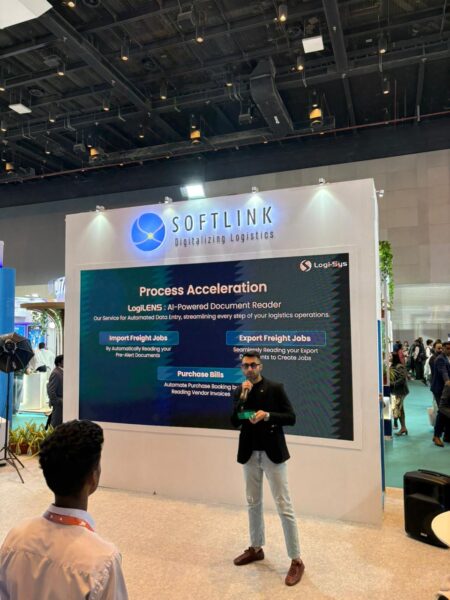
KaleLogistics, a global IT solutions partner, offers a comprehensive suite of IT solutions for the logistics industry. When asked about his sponsorship of the FFFAI Convention and how he felt it had helped the logistics industry, Vineet Malhotra, Director, Kale Logistics, replied, “We have been involved with FFFAI and have supported the convention for a very long time. FFFAI and Kale collaborate continually to develop cutting-edge platforms and channels that make it easier for importers, exporters, freight forwarders, and customs brokers to conduct business. Our common goal is to empower the Indian logistics sector from scratch. After a two-year hiatus, the industry gathered once again, and more than 500 delegates graced the event. The conference’s theme, Logistics-Reshape, Embrace & Surge in the Digital Era, echoed our philosophy and provided the ideal setting for urging industry players to embrace digitisation. Congratulations to the FFFAI organising committee for staging a terrific convention that created new opportunities for the sector.
The pandemic, Malhotra remarked, has caused the logistics community to alter how data is managed and exchanged. The systems were primarily paper-based for years and depended on obsolete procedures. Aside from that, the logistics industry has realised technology’s potential and the endless opportunities it can provide in terms of productivity, sustainability, and basic ease of doing business. Leading the way in providing cutting-edge, modern community and business solutions is Kale Logistics Solutions. The entire logistics ecosystem is mapped to these solutions.
Since the pandemic, cargo has become incredibly important. We observed an increase in demand for medications, necessities, FMCG, agriculture, and e-commerce. Congestion in the ports and airports, backlogs in the warehouses or during transport, and container shortages were all caused concurrently by supply chain disruptions. Due to these conflicting circumstances, the industry came to the conclusion that using digital technology alone would not be sufficient to develop a digital and autonomous supply chain; instead, they needed to be an interconnected ecosystem with real-time data routing. Thus, this drove a number of new developments, such as supply chain digitisation at the grassroots level, which completely changed how the cargo segment conducts business.
The logistics industry is using digitalisation to adapt to unique cultures, implement new initiatives, and even reinvent consumer experiences in order to meet market needs and respond to unpredictable business conditions.
Vineet Malhotra
The logistics industry is using digitalisation to adapt to unique cultures, implement new initiatives, and even reinvent consumer experiences in order to meet market needs and respond to unpredictable business conditions. Modern technology-powered digital interventions, like the Cargo Community System (CCS), are encouraging the industry to rapidly traverse the digital transformation ladder. By connecting systems of supply chain participants collectively to maximise synergies and benefits, CCS around the world is assisting in lowering overall logistics costs and enabling improved supply chain planning.
The technology, Malhotra retorted, is already available for use in ports and airports; all that is required is effective leadership. The wait-and-see approach to the problems of environmental and economic sustainability is no longer an option (for someone else to do something before we start). We think that the airports or cities that get going first will benefit the most and draw in more cargo, and the rest can just keep looking in awe at the others. So we believe the time to act is now and we are there to hold hands throughout the whole digital transformation journey.
Digitisation is a journey, not a destination. Organizations need to understand this very clearly. AI, IoT, and Big Data are some of the phrases that have made it into the vocabulary of the logistics sector as technology continues to overthrow the old ways of doing business. Some of the primary objectives of automation in the freight industry are enhanced customer experience, online services, transparency of data, and a sustainable future for the logistics industry. Digitalisation provides an uninterrupted flow of data and processes among all the touch points until the successful completion of the shipment. These touchpoints include but are not limited to digital booking, digital invoicing, e-contracts and constant status updates. Platforms like the Cargo Community System aim at streamlining, upgrading, and standardising the interactions with and between supply chain stakeholders. It helps to advance digital collaboration and makes way for enhanced efficacy by promoting a powerful partnership between carriers, freight forwarders, airports, ports, transporters, regulatory agencies, and traders.
According to Malhotra, “When the year began, we were confident that the industry would rebound and that tech adoption would continue to advance. It has played out the way we envisaged. There is more demand for cloud-based and SaaS-based solutions. We are focused on digitising more airports and ports this year. We have already touched 100 plus air cargo stations and are talking to 40 more airports and ports at this point in time to transform them digitally. We have introduced the Maritime Single Window, which is now a mandate from the International Maritime Organisation (IMO) to be implemented in all ports before January 2024. We are working closely with global bodies to give impetus to digital policies and initiatives.”











